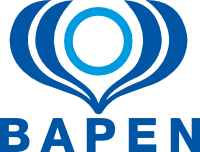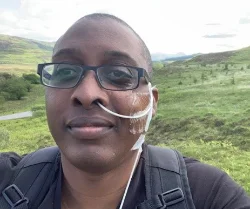
Cooking has always been a passion of mine. Growing up in Birmingham with my parents and older brother, I knew from the age of seven that I wanted to be a chef. At sixteen, I started a catering apprenticeship, and not long after I was invited to try teaching. I gave it a go, and after a taster session, I was hooked. I went on to teach professional cookery for nine years – from colleges to hotels and restaurants – training chefs across all levels. I specialised in gourmet and à la carte cuisine, as well as wedding cakes, confectionery and patisserie.
In 2012, I moved to Cornwall with my partner, Jo, who was born and raised in the area and has worked as an accuracy checking technician in pharmacy for over twenty-five years. Life to ok a new direction, and we set up a catering business together, providing meals for elderly residents in four independent living homes – two in Cornwall and two in Plymouth. We had a brilliant team of twelve staff and a thriving business. Food has always meant more to me than just sustenance – it’s about care, dignity, and connection, especially for those unwell or vulnerable.
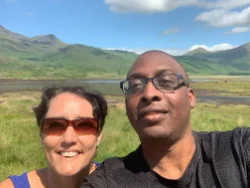
In 2017, everything changed. My health took a dramatic turn, and I was forced to give up the business. It was heart-wrenching – not just the loss of work, but the relationships we’d built. It was more than a job. I still hope to return to work one day, perhaps something I can do from home. For now, I’m focusing on managing my health, which is a full-time job in itself.
Initially, I was diagnosed with type 2 diabetes, but the medication didn’t work. I wasn’t responding as expected and, despite raising concerns, I was told to continue with the standard treatment. I kept pushing for answers. Eventually, I asked for the C-peptide test to be repeated – a test that helps distinguish between type 1 and type 2 diabetes. After years of writing letters and chasing appointments, the test was finally repeated. The diagnosis came back as type 1 diabetes.
That moment was one of immense relief. For two years I had been on the wrong treatment, and during that time, my blood sugars were out of control. I sustained damage to my vagus nerve, leading to a condition called gastroparesis. As a result, I was placed on enteral feeding.
I had imagined a smoother, more methodical path – that I’d leave hospital with all the information and support I needed
The decision to place a feeding tube happened quickly. My consultant rang and told me to pack a bag for ten days – they needed to fit a nasogastric (NG) tube urgently. That eventually led to my current PEG-J tube, which I’ve had for a year now. But nothing about this process has been simple. I had imagined a smoother, more methodical path – that I’d leave hospital with all the information and support I needed. Instead, the fitting was traumatic, and the reality of living with artificial nutrition was far more complex than I’d expected.
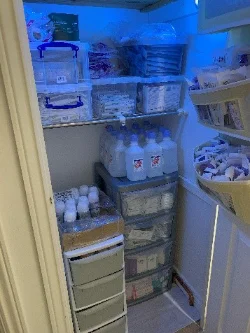
Even though I was given training and support from a nurse shortly after discharge, I often found myself needing to seek out answers on my own more times than I’d anticipated. I’ve tried to keep my care to a home-setting as much as possible. A tube blockage might mean hours waiting to be triaged, seen in surgical assessment, and eventually treated by a gastroenterologist. The learning curve has been steep, and I’ve had to purchase many of the supplies myself – from wipes and swabs for the stoma, to catheter strips – just to keep the area clean and prevent infections. One doctor commented on how few infections I’ve had, and it’s simply because I’ve had to be so meticulous about hygiene.
Finding the right feed took time. I went through four different types before finding one my body could tolerate. Even now, I remain nutrient-deficient in some areas. I’ve learned how to vent my stomach contents through the tube to relieve pressure and reduce vomiting – a small but significant win in managing my symptoms.
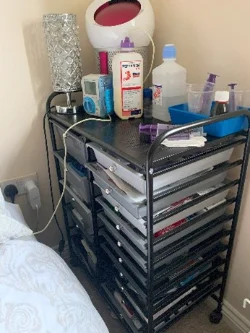
Mike’s bed
Living with both gastroparesis and diabetes – along with eight other chronic conditions – requires a careful balance. I do my medicating myself as Jo works four days a week, and together we’ve built a routine that works. Whether we’re at home or out at a restaurant or the cinema, we bring everything we might need: sterile water, hot water for unblocking the tube, medication, and more. A trip out now means packing a tiny suitcase.
I used to love swimming, reading, travelling – and I still do these things when I can. Before I got ill, Jo and I travelled a lot. Now, everything needs more planning. Even short trips require thinking about every eventuality. Stamp collecting is another lifelong hobby of mine – I’ve been doing it since I was seven – and it’s become a comforting constant throughout the ups and downs.
Looking back, the diagnosis journey was exhausting. It took a two-hour multi-disciplinary team meeting and a nine-page letter I wrote – one I nearly didn’t send – to finally be heard. My CGM (Continuous Glucose Monitor) is now funded thanks to that same team, and while it hasn’t been an easy road, I’m thankful we persisted.
What I’ve learned is that it’s okay to ask questions – even the same ones, over and over. Consultants have incredible knowledge, but so do you, about your own body. If something doesn’t feel right, stand your ground. This is especially the case when repeatedly speaking to new consultants. This journey hasn’t been what I expected, but it’s taught me a lot about perseverance, partnership, and how vital it is to be your own advocate.
If I could offer one piece of advice for other people on home artificial nutrition, it would be to really get to know enteral feeding – do your own research and stay informed. Doctors aren’t with you 24/7, so being proactive is essential. The more you understand your condition and your equipment, the more confident and independent you’ll feel in managing it. It might feel overwhelming at first, but knowledge truly is power, and it will help you in the long run.
